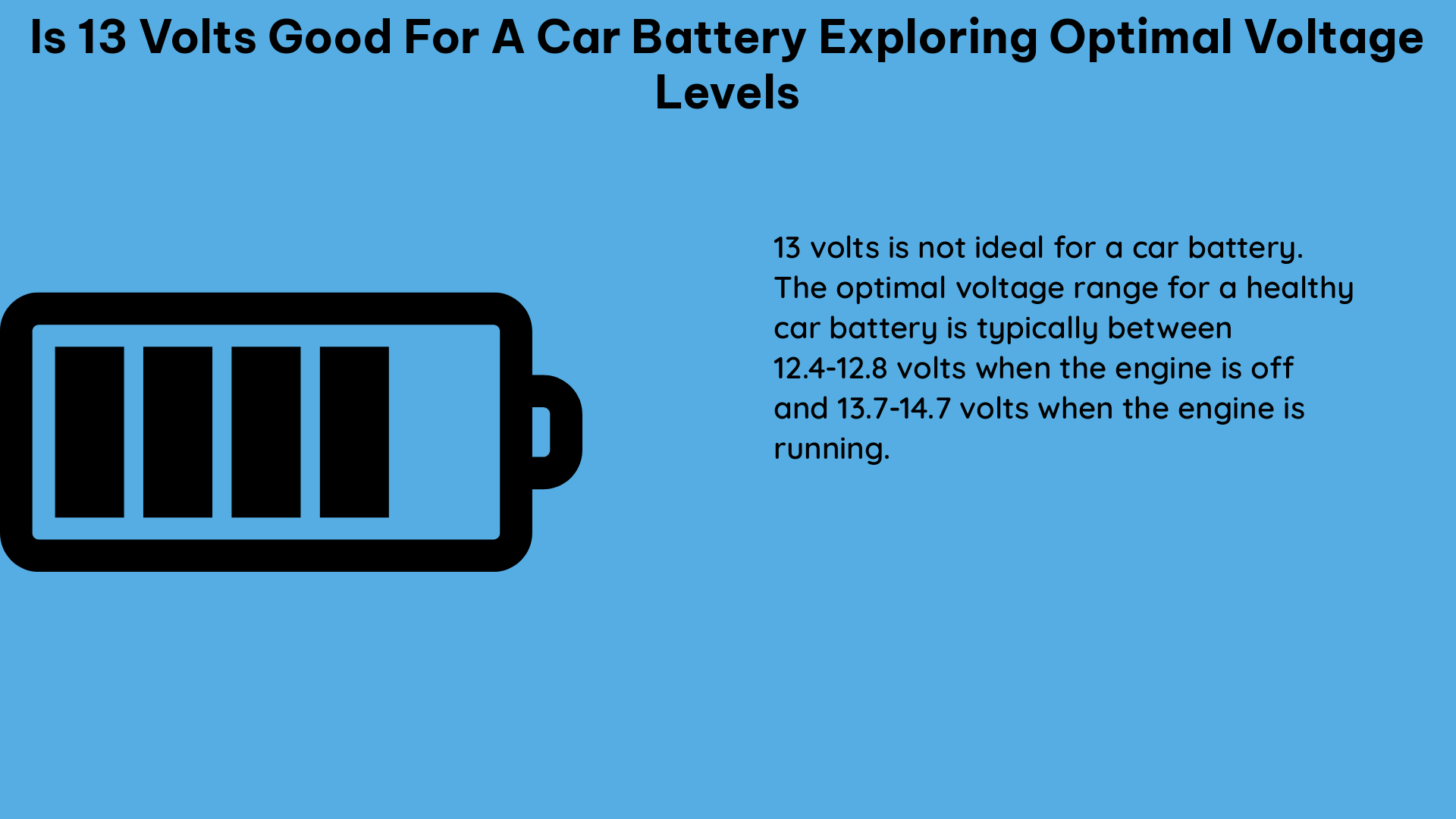The optimal voltage range for a car battery is a crucial factor in ensuring the proper functioning and longevity of your vehicle’s electrical system. Understanding the ideal voltage levels can help you diagnose and address any issues with your car’s battery, alternator, or electrical components. In this comprehensive guide, we’ll delve into the details of car battery voltage, exploring the optimal range and what a 13-volt reading might signify.
Understanding Car Battery Voltage Levels
A fully charged car battery should typically measure between 12.6 to 14.4 volts when the engine is off. This range is considered the optimal voltage level for a car battery, as it ensures the battery is adequately charged and able to provide the necessary power to start the engine and power the vehicle’s electrical systems.
Resting Voltage
When the engine is off, the battery’s “resting voltage” should be at least 12.6 volts. This resting voltage indicates that the battery has sufficient charge to start the engine and power the electrical systems when the engine is not running.
Charging Voltage
When the engine is running, the battery voltage should typically rise to a range of 13.5 to 14.5 volts. This increase in voltage is due to the alternator charging the battery and providing additional current to the electrical systems. If the voltage drops below this range, it may suggest an issue with the alternator or a drain on the electrical system.
Is 13 Volts Good for a Car Battery?

A car battery with a voltage of 13 volts is generally considered within the optimal range for a fully charged battery. This voltage level indicates that the battery is in good condition and able to provide the necessary power to start the engine and operate the vehicle’s electrical systems.
Factors Affecting Battery Voltage
Several factors can influence the voltage of a car battery, including:
- Battery Age and Condition: As a battery ages, its ability to hold a charge may diminish, leading to lower voltage readings.
- Alternator Performance: If the alternator is not functioning correctly, it may not be able to maintain the optimal charging voltage, resulting in a lower battery voltage.
- Electrical System Loads: Heavy electrical loads, such as running multiple accessories or devices, can temporarily lower the battery voltage.
- Temperature: Extreme temperatures, both hot and cold, can affect the battery’s voltage and performance.
Importance of Load Testing
While a 13-volt reading is generally within the optimal range, it’s important to note that voltage alone may not provide a complete picture of the battery’s health. A load test, which measures the battery’s ability to deliver current under load, is a more accurate way to determine the battery’s overall condition and its ability to meet the vehicle’s power demands.
Maintaining Optimal Battery Voltage
To ensure your car battery maintains optimal voltage levels, consider the following tips:
- Regular Battery Checks: Periodically check the battery’s voltage, both with the engine running and when it’s off, to ensure it’s within the optimal range.
- Alternator Inspection: Have your vehicle’s alternator inspected regularly to ensure it’s charging the battery properly and maintaining the correct voltage.
- Electrical System Maintenance: Address any issues with the vehicle’s electrical system, such as excessive drain or faulty wiring, to prevent voltage fluctuations.
- Battery Replacement: Replace the battery when it reaches the end of its lifespan, typically every 3-5 years, to ensure reliable starting and electrical system performance.
Conclusion
In summary, a car battery with a voltage of 13 volts is generally considered within the optimal range for a fully charged battery. However, it’s essential to perform a load test to ensure the battery’s overall health and ability to deliver the necessary power to the vehicle’s electrical systems. By understanding the optimal voltage levels and maintaining your car’s electrical system, you can ensure reliable performance and extend the life of your car’s battery.
References:

The lambdageeks.com Core SME Team is a group of experienced subject matter experts from diverse scientific and technical fields including Physics, Chemistry, Technology,Electronics & Electrical Engineering, Automotive, Mechanical Engineering. Our team collaborates to create high-quality, well-researched articles on a wide range of science and technology topics for the lambdageeks.com website.
All Our Senior SME are having more than 7 Years of experience in the respective fields . They are either Working Industry Professionals or assocaited With different Universities. Refer Our Authors Page to get to know About our Core SMEs.